Text
Free textbooks
These are links to free ebooks because we’re broke from paying full tuition for online classes. Just search your textbooks in one of these links and you can download a free PDF version of your textbooks! We love to pirate textbooks and save hundreds of dollars. :D
https://b-ok.cc
https://www.pdfdrive.com
http://gen.lib.rus.ec
http://www.gutenberg.org
http://slader.com (for textbook answers)
https://openstax.org/ (FREE textbooks on a variety of subjects groups)
Please share this with your fellow classmates because we love to save $$. Help a friend! This is totally legal. Happy studying!
Feel free to add new links to free textbooks :)
1K notes
·
View notes
Text
College should cost two dollars and then when you graduate everyone apologizes for wasting your time
73K notes
·
View notes
Text
Begging my History professor to stop showing PragerU videos in class/on assignments
#he's an AMAZING prof otherwise but why#prageru#apparently one of his colleagues/friends is allen guelzo#so like I know why but PragerU SUCKS and he's gotta know that#college#negativity#my posts#university
1 note
·
View note
Text
TurnItIn... flagged.... my last name... my citations... things I properly quoted.... what.
#turnitin#plagiarism#it has a 28% similarity report but WHAT AM I SUPPOSED TO DO ABOUT THAT#the only justifiable one is one I should have put in quotes BUT I GAVE A CITATION FOR THE IDEA#also one sentence where you literally can't word it any other way because that's WHAT THE STUDY WAS ABOUT#/showed#only one if my citations is not flagged#*of#this software sucks#school#college#my posts#negativity
0 notes
Text


[Photo ID - two photos of cup ramen. The first photo shows the noodles, broth, and dehydrated vegetables in the cup. The second photo shows the side of the cup, which is labeled: "Kang Shi Fu: Seafood Flavor". End ID]
Had a fun extra lecture about Ramen! It was super interesting, and the professor was a great speaker. Some fun, informal notes under the cut :)
(Paraphrasing) "People assume that when Asian people get rich, they eat less Ramen. No, more money means more ramen."
Noodle Soup in Asia
China - La Mian*
Japanese - Ramen*
Vietnamese - Pho (pronounced "FA")
Thai - Tom Yum
Korean - Mul Naengmyeon or cold noodle soup (best in winter)
*Japanese people tend to have trouble differentiating between the "L" and "R" sounds. The name originally came from China
Japan Food Insecurity
During WWII, Japan occupied part of China and harvested rice, soybean, salt, and sugar.
US exported wheat to Japan (which preferred rice)
Wheat -> Flour -> Bread/Noodles
July 2, 1946 Rations: 297 grams of food per person/per day
Black Market for food
Yatai - a food cart where the noodles are made in the same place; seen in Dragon Ball, Naruto
Instant Ramen
August 25th - International Instant Ramen Day
Momofuku Ando (1910-2007) - the founder of Nissin Food Company and inventor of instant Ramen
Background: Momofuku Ando's wife was frying tempura, which made him realize he could flash-fry noodles to get rid of moisture and make them naturally last longer.
1958 - first package of instant Ramen: Original Chikin Ramen
1971 - first cup of instant Ramen
Samurai Noodles "The Originator" (video)
Extra ^-^
Soba - plainer than Ramen, Baek wheat
Ramen - rich in flavor, wheat
Korean Samyang Buldak (SPICY)
Shinyokohama Ramen Museum in Yokohama, Japan - Ramen museum; $6 entry fee + $6 custom noodles
Since Ramen is meant to be a worker's meal and meat is expensive, they add an egg for nutrients

[Photo ID - a gif of an animated steaming bowl of Ramen. It has two slabs of meet, and egg, noodles, broth, and some vegetables. The bowl is light blue with red and dark blue lines coming from the bottom. End ID]
#food tw#notes#he also talked about his favorite ramen/pho places in our area but I'm not gonna include that for privacy reasons#BUT#student: what's your favorite ramen place?#prof: [place]#Student: why?#prof: bc I live next to it#ramen#food#la mian#pho#tom yum#mul naengmyeon#cold noodle soup#please add on if ya know stuff about it!#my posts#oh also. the prof was asian himself (for context of the first quote)
0 notes
Text
Weekly To-Do
Monday - Read [Supplemental Book] and review Ch. 11 of textbook
Tuesday - Finish [Supplemental Book], post to [Book] discussion, start Math Homework
Wednesday - Start History Textbook Ch.14, work on Math Homework
Thursday - read HIST Textbook Ch.14, Finish Math Homework, take first Math Quiz
Friday - read HIST Textbook Ch.14, Math Quiz 2
Saturday - finish HIST Textbook Ch.14, take Ch.14 quizzes, [Supplementary Book] Exam
Other - video editing

[Photo ID - A GIF of quote in a circle. The rim of the circle has small circles moving clockwise and leaves next to them. The quote reads: "Each morning we are born again. What we do today is what matters the most." It is attributed to Buddha. End ID]
0 notes
Text

[Photo ID - screenshot that reads "God, the Shakers believed, had a..." before being cut off. End ID]
Really though my textbook as throwing some shade here ngl
#religion tw#photo id#the shakers#studying#random#funny#god mention#religion mention#studyblr#my posts#textbook
0 notes
Text
Finals Preparation
Math
Formulas and Concepts list
Practice, practice, practice
History
Review textbook and notes
Fill missing chapters
Print and review chapter outlines
Go through the review PowerPoints
Education
Compile and review notes
Fill missing chapters
Create practice material
#math and english don't seem to have 'real' finals so it's mainly history and educ I need to study for#'what's educ-' shhhhhhhhh#finals preparation#studyblr#studentblr#college student#college#to do list#finals to do list#my posts
0 notes
Text
Weekly To-Do
Read a chapter of my History textbook
History Quiz & Map Exercises
Reply to someone on my Math Discussion Board (waiting for someone else to post)
Finish Math HW 7
Write an extra credit History paper
Write a paper about a debate/event I attended
Find a way to edit a video for English
Schedule
Friday: 1-2 sections of history textbook, math discussion, read history article/start paper
Saturday: read 1-2 sections, work on history paper and debate paper, HW 7
Sunday: Finish the history chapter, take the quizzes, finish the history paper
If the debate paper isn't done, finish Monday
#to do list#weekly to do#weekly to do list#studyblr#I've already finished some stuff so this is what's left#trying to peer pressure my way into getting shit done BEFORE the last minute#my posts
0 notes
Text

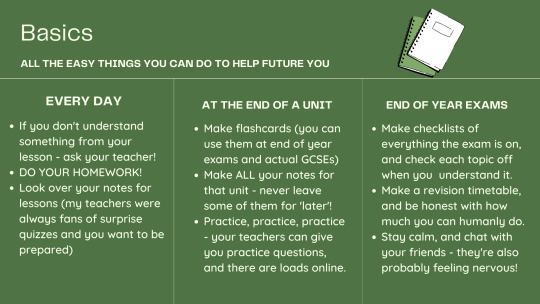
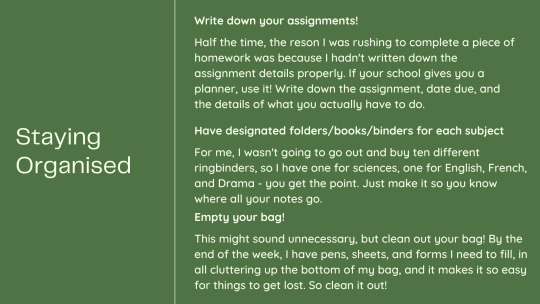

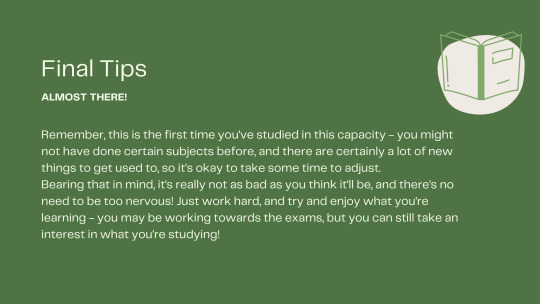
If I can only stress one piece of advice, it's: DO YOUR NOTES AT THE END OF A TOPIC! I didn't do that for the first term of the year (despite half my teachers advising me to), and it took me ages to catch up on everything. So incorporate it into your revision, and whether you type them, handwrite them, or anything else, just do them!
If you're starting the GCSE course this year and want to chat about it, my inbox is always open and you can send me a message if you want! <3
Transcript under the cut!
Slide 1:
For all the new year 10s!
Top tips for starting the GCSE course, staying on top of things, and staying happy in this crazy time!
Slide 2: Basics
All the easy things you can do to help future you!
Everyday:
If you don't understand something from your lesson - ask your teacher!
DO YOUR HOMEWORK!
Look over your notes for lessons (my teachers were always fans of surprise quizzes and you want to be prepared)
At the end of a unit:
Make flashcards (you can use them at end of year exams and actual GCSEs)
Make ALL your notes for that unit - never leave some of them for 'later'!
Practice, practice, practice - your teachers can give you practice questions, and there are loads online
End of year exams:
Make checklists of everything the exam is on, and check each topic off when you understand it.
Make a revision timetable, and be honest with how much you can humanly do.
Stay calm, and chat with your friends - they're also probably feeling nervous!
Slide 3: Staying Organised
Write down your assignments!
Half the time, the reason I was rushing to complete a piece of homework was because I hadn't written down the assignment details properly. If your school gives you a planner, use it! Write down the assignment, date due, and the details of what you actually have to do.
Have designated folders/books/binders for each subject.
For me, I wasn't going to go out and buy ten different ringbinders, so I have one for sciences, one for English, French, and Drama - you get the point. Just make it so you know where all your notes go.
Empty your bag!
This might sound unnecessary, but clean out your bag! By the end of the week, I have pens, sheets, and forms I need to fill, in all cluttering up the bottom of my bag, and it makes it so easy for things to get lost. So clean it out!
Slide 4: Apps + Websites I've used
Adapt - Makes a revision timetable and reminds you topics to look over each day!
Voice Recorder - I record myself speaking in French so that I can listen back and improve my accent.
Quizlet - I think most people know about this one - flashcards galore!
Physics and Maths Tutor - Literally a lifesaver. Notes, practice questions, flashcards, exam questions - and for so many subjects!
Save My Exams - Practice questions and notes! You have to pay for some of them, but I only use the free resources and they're great!
Slide 5: Final Tips (Almost There!)
Remember, this is the first time you've studied in this capacity - you might not have done certain subjects before, and there are certainly a lot of new things to get used to, so it's okay to take some time to adjust.
Bearing that in mind, it's really not as bad as you think it'll be, and there's no need to be too nervous! Just work hard, and try and enjoy what you're learning - you may be working towards the exams, but you can still take an interest in what you're studying!
198 notes
·
View notes
Photo



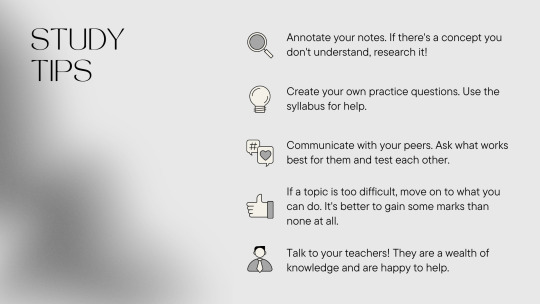
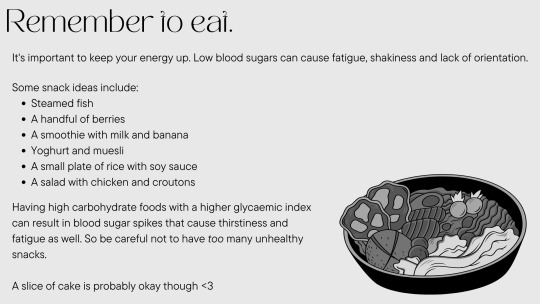
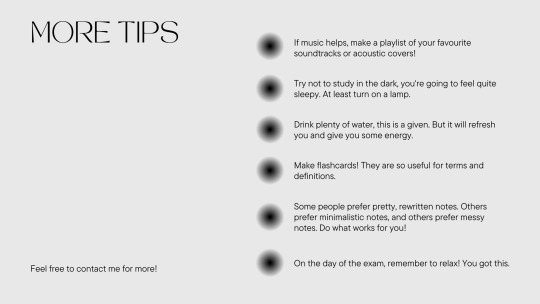
142 notes
·
View notes
Text

hello all! i have written quite a few research papers during my time in university, and these are some of the tips and tricks i’ve used while writing! (disclaimer: these are from the perspective of a history and spanish major so the process may be different for other majors and of course everyone is different! this is just what helps me)
1. spend time at the library
this is the most important tip in this post, hence its spot as number 1. not only is it great to spend time writing in the library to help you focus, but there are countless resources at your university’s library that will help you write the paper. depending on your university, you may have archives, an extensive array of books on the subject, and staff members specifically hired to help students do research. take advantage of these resources!
2. write an outline
having an outline is immensely helpful while writing a research paper. it helps you organize your thoughts and write more cohesively, especially when the paper is 8+ pages long. another important part of outlines is coming up with a clear thesis before you start writing so research is guided by a main point.
3. go to your professor’s office hours
going to office hours can be helpful in multiple ways. your prof can help you identify a topic, can read over a rough draft, and give you research tips. as professors, they have done research themselves and can help point you in the right direction. plus, professors love when students visit their office hours because a majority of their students don’t, so your professor will appreciate it!
4. give yourself time to revise a rough draft
including myself, we have all procrastinated. the last couple years of school have been really hard, so don’t blame yourself if you find yourself behind on your work. but, if you can, writing a rough draft ahead of time and working on the paper throughout the semester can make the final product so much better! try to find a friend (or your professor!^) to read the rough draft to get multiple eyes on the paper. some professors will even require that you submit a rough draft for the class.
5. do research at an archive
obviously this is not possible for every paper you’re assigned in college. but, if it’s for an important class for your major, doing research in person at an archive can make your paper unique and make you stand out. find a local institution or your university’s archives and see if they have any sources relevant to your topic. then, make an appointment or just show up (depending on their policy) and gain access to archival materials!
#study#studyblr#studying#study tips#studyblr advice#research#research paper#research paper tips#university#college#long post#reblog
323 notes
·
View notes